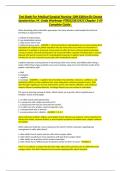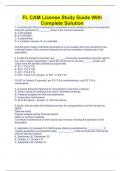Exam (elaborations)
Medical-Surgical Nursing 10th Edition By Donna Ignatavicius, M. Linda Workman 9780323612425 Chapter 1-69 Complete Guide .
- Course
- Institution
- Book
Medical-Surgical Nursing 10th Edition By Donna Ignatavicius, M. Linda Workman 9780323612425 Chapter 1-69 Complete Guide .
[Show more]




